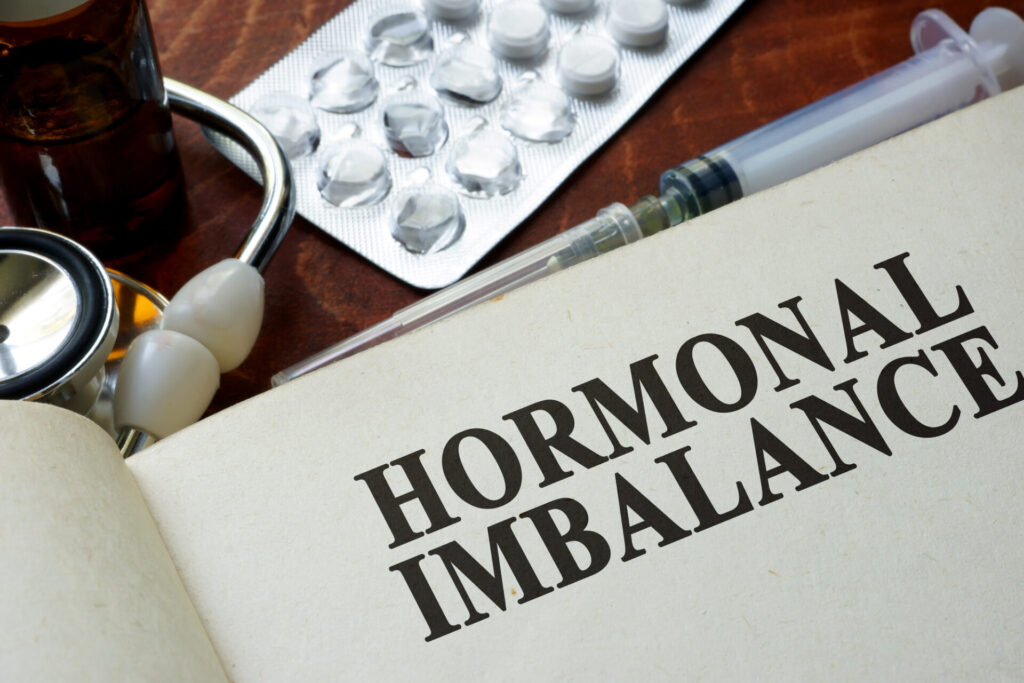
More Hormone Therapy Articles
What Causes Hormone Imbalance in Women? Do Natural Solutions Exist?

Hormone imbalance is a common issue that affects many women at some point in their lives. Hormones play a crucial role in regulating various bodily functions, including metabolism, mood, and reproduction. When hormones become imbalanced, it can lead to a wide range of symptoms, including weight gain, fatigue, irregular periods, and mood swings.
Understanding Hormone Imbalance
Hormonal imbalance occurs when there is too much or too little of a particular hormone in the body. This can lead to a range of symptoms and health problems. Hormonal imbalances can occur at any age, but they are more common in women than in men.
What is Hormonal Imbalance?
Hormonal imbalance occurs when there is a disruption in the normal levels of hormones in the body. Hormones are chemical messengers that regulate many processes in the body, including the menstrual cycle, mood, energy, weight gain, and sleep. When there is an imbalance in hormone levels, it can lead to a range of symptoms and health problems.
Common Hormones Affected
There are several hormones that can be affected by hormonal imbalances in women. These include estrogen, progesterone, and testosterone. Estrogen is the primary female sex hormone and is responsible for the development of female sexual characteristics. Progesterone is another female sex hormone that plays a role in the menstrual cycle and pregnancy. Testosterone is a male sex hormone, but women also produce small amounts of it.
Signs and Symptoms
The signs and symptoms of hormonal imbalance can vary depending on which hormones are affected and the severity of the imbalance. Common symptoms of hormonal imbalance in women include:
- Irregular menstrual cycle
- Mood swings
- Fatigue
- Weight gain
- Insomnia
- Hot flashes
- Decreased libido
It is important to note that these symptoms can also be caused by other health conditions, so it is important to speak with a healthcare provider to determine the underlying cause of the symptoms.

Causes of Hormone Imbalance in Women
Hormone imbalance is a common issue that affects many women. The causes of hormonal imbalances are varied, and can be related to natural life stages, lifestyle factors, or medical conditions.
Natural Life Stages
Women experience several natural life stages that can cause hormonal imbalances. Puberty, pregnancy, and menopause are all examples of life stages that can cause hormonal changes. During puberty, the body undergoes significant hormonal changes as it prepares for adulthood. Similarly, during pregnancy, the body undergoes hormonal changes to support the growth and development of the fetus. Menopause is another life stage that can cause hormonal imbalances, as the body’s production of estrogen and progesterone decreases.
Lifestyle Factors
Lifestyle factors can also contribute to hormonal imbalances in women. Stress, weight, and birth control are all examples of lifestyle factors that can impact hormonal balance. Stress can cause an increase in the hormone cortisol, which can disrupt the balance of other hormones in the body. Weight can also impact hormonal balance, as excess fat can produce hormones that disrupt the body’s natural hormonal balance. Birth control can also impact hormonal balance, as it can alter the body’s production of estrogen and progesterone.
Medical Conditions
Certain medical conditions can also contribute to hormonal imbalances in women. The thyroid gland, ovaries, and insulin levels can all impact hormonal balance. Issues with the thyroid gland can cause an imbalance in the production of thyroid hormones, which can impact other hormones in the body. Similarly, issues with the ovaries can impact the production of estrogen and progesterone. Insulin levels can also impact hormonal balance, as insulin is involved in the regulation of several hormones in the body.
Diagnosing Hormone Imbalance
When a woman experiences symptoms of hormone imbalance, it is important to consult with a healthcare provider to determine the underlying cause. Diagnosing hormone imbalance can be a complex process, but there are several common diagnostic tests that can help identify the problem.
Common Diagnostic Tests
One of the most common tests used to diagnose hormone imbalance is a blood test. This test measures the levels of various hormones in the blood, including follicle-stimulating hormone (FSH), thyroid hormones, and sex hormones. Abnormal levels of these hormones can indicate a hormone imbalance.
Another test that may be used is a saliva test, which measures the levels of hormones in the saliva. This test can provide more accurate results than a blood test, as it measures the levels of hormones that are active in the body.
In some cases, an ultrasound or other imaging test may be used to examine the endocrine system and identify any abnormalities.
Understanding Test Results
Once the diagnostic tests have been performed, it is important to understand the results in order to determine the appropriate treatment plan. Depending on the specific hormone imbalance, treatment may involve lifestyle changes, medication, or natural remedies.
It is important to work closely with a healthcare provider to develop a treatment plan that is tailored to the individual’s needs. With the right diagnosis and treatment, it is possible to manage hormone imbalance and improve overall health and well-being.
Natural Solutions for Hormone Balance
Hormonal imbalances can be corrected through natural solutions. These solutions are safe and effective, and they can help women achieve a better quality of life. Here are some natural steps to fix these imbalances:
Dietary Adjustments
A healthy diet is essential for hormonal balance. Women should eat a diet that is rich in fruits, vegetables, whole grains, lean protein, and healthy fats. They should avoid processed foods, sugar, and caffeine. Women should also drink plenty of water to stay hydrated.
There are certain foods that can help balance hormones. For example, flaxseeds are rich in lignans, which can help balance estrogen levels. Cruciferous vegetables such as broccoli, cauliflower, and kale contain indole-3-carbinol, which can help balance estrogen levels and reduce the risk of breast cancer.
Lifestyle Changes
Lifestyle changes can also help balance hormones. Women should aim to get enough rest and exercise regularly. Yoga is a great way to reduce stress and improve hormonal balance. Women should also try to manage stress through meditation, deep breathing, or other relaxation techniques.
Weight loss can also help balance hormones. Fat cells produce estrogen, so losing weight can reduce estrogen levels. Women should aim to maintain a healthy weight through a balanced diet and regular exercise.
Alternative Therapies
There are several alternative therapies that can help balance hormones. For example, acupuncture can help regulate the menstrual cycle and reduce symptoms of PMS. Herbal supplements such as black cohosh, red clover, and dong quai can also help balance hormones.
Women should always consult with their healthcare provider before starting any new supplements or alternative therapies. It is important to note that natural solutions may take time to work and may not be suitable for everyone.
Medical Treatments
Hormone Replacement Therapy
Hormone replacement therapy (HRT) is a medical treatment that involves the use of synthetic hormones to replace the hormones that the body is no longer producing. HRT is commonly used to treat menopausal symptoms, such as hot flashes and vaginal dryness, by increasing estrogen levels. However, it can also be used to treat other hormone imbalances in women.
HRT can be administered in various forms, including pills, patches, creams, gels, and injections. It is important to note that HRT has some potential risks, such as an increased risk of breast cancer, blood clots, and stroke. Therefore, it is important to discuss the potential benefits and risks of HRT with a healthcare provider before starting treatment.
Medication and Supplements
In addition to HRT, there are other medications and supplements that can be used to treat hormone imbalances in women. For example, birth control pills can be used to regulate menstrual cycles and decrease the risk of ovarian and endometrial cancer. Anti-androgen medications can be used to decrease the production of androgens, which can help to treat conditions such as polycystic ovary syndrome (PCOS).
There are also a variety of supplements that claim to help balance hormones in women. However, it is important to note that there is limited scientific evidence to support the effectiveness of these supplements. Some examples of supplements that are commonly used for hormone balance include:
- Black cohosh: This herb is commonly used to treat menopausal symptoms, such as hot flashes and mood swings.
- Dong quai: This herb is commonly used to regulate menstrual cycles and treat menopausal symptoms.
- Vitex: This herb is commonly used to regulate menstrual cycles and treat conditions such as PCOS.
It is important to discuss the use of any medications or supplements with a healthcare provider before starting treatment, as they may interact with other medications or have potential side effects.
Prevention and Management
Monitoring Hormone Levels
Regular monitoring of hormone levels can help women detect any imbalances early on and take appropriate measures to address them. This can be done through blood tests, saliva tests, or urine tests, depending on the hormones being measured.
Women who are at high risk of hormonal imbalances, such as those with a family history of endocrine disorders or those who have undergone hormonal treatments, should consider regular monitoring as a preventative measure.
Long-term Health Strategies
In addition to monitoring hormone levels, women can take a proactive approach to preventing and managing hormonal imbalances by adopting healthy lifestyle habits. These may include:
- Maintaining a healthy weight: Being overweight or underweight can disrupt hormone levels and increase the risk of hormonal imbalances.
- Eating a balanced diet: A diet rich in whole foods, fruits, vegetables, and lean proteins can help support hormone balance.
- Reducing stress: Chronic stress can disrupt hormone levels, so it’s important to find ways to manage stress, such as through exercise, meditation, or therapy.
- Getting adequate sleep: Sleep is crucial for hormone balance, so aim for 7-8 hours of quality sleep each night.
- Avoiding harmful substances: Smoking, excessive alcohol consumption, and exposure to environmental toxins can all disrupt hormone levels.
By adopting these long-term health strategies, women can help prevent hormonal imbalances and maintain optimal health and well-being.
Final Words on Hormone Imbalance in Women
Hormone imbalances in women can have a significant impact on their overall health and well-being. It is important to understand the various factors that can contribute to hormonal imbalances, such as stress, poor diet, lack of exercise, and certain medical conditions.
While there are various medical treatments available for hormone imbalances, many women prefer to explore natural solutions. These may include lifestyle changes such as a healthy diet, regular exercise, stress reduction techniques, and getting adequate sleep.
In addition, there are a variety of natural supplements and herbs that may help promote hormone balance and support overall hormone health. These include maca root, chasteberry, black cohosh, and evening primrose oil, among others.
It is important to note that while natural solutions may be effective for some women, they may not be appropriate or effective for everyone. It is always important to consult with a healthcare provider before beginning any new supplement or herbal regimen.
Overall, maintaining hormone health and balance is essential for women’s overall health and well-being. By understanding the various factors that can contribute to hormonal imbalances and exploring natural solutions, women can take proactive steps towards promoting optimal hormone health.
Other Articles You May Find of Interest...
- What Causes Hormone Imbalance in Women? Do Natural Solutions Exist?
- Colon Cancer Risk Reduced 38% In Women Using HRT
- Dieting And Exercising And Not Seeing Results? It Could Be Imbalanced Hormones!
- Sex Hormones Protect Your Heart?!
- Taking Charge of Your Health with Online Hormone Therapy Consultations
- Understanding the Benefits of Online HRT Care Via Telemedicine
- Dieting And Exercising And Not Seeing Results? It Could Be Imbalanced Hormones!

















